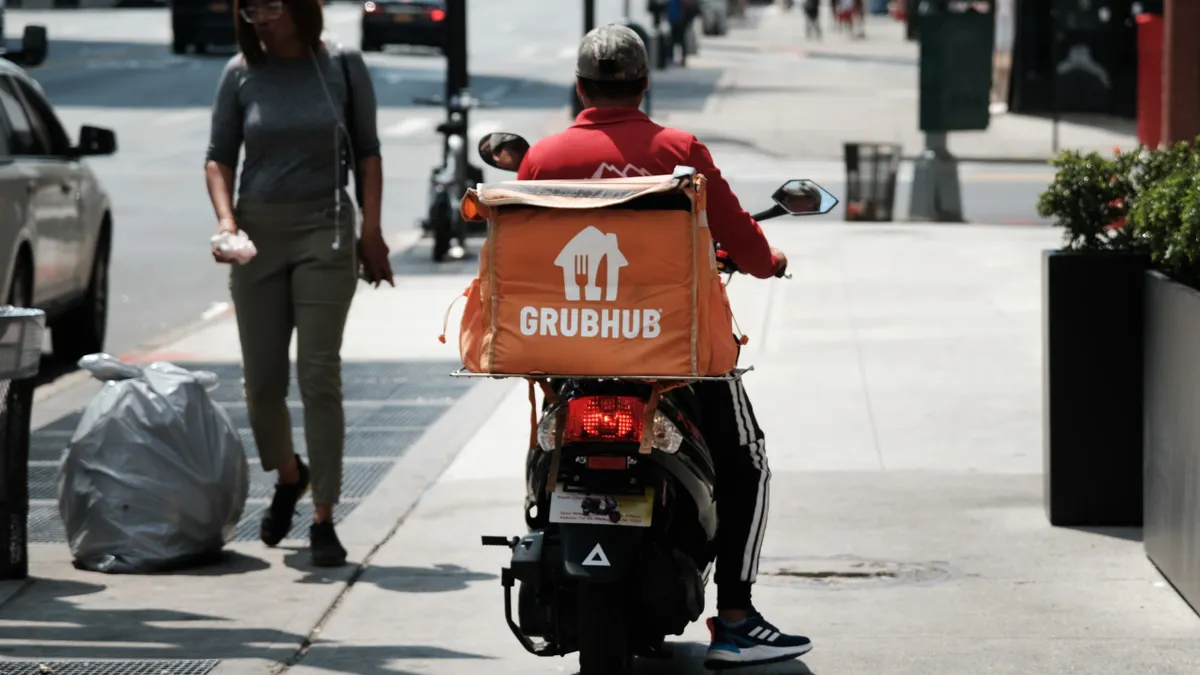Dive Brief:
- Grubhub has agreed to pay $25 million in a settlement with the Federal Trade Commission and the Illinois Attorney General regarding allegations that the aggregator deceived diners over delivery costs and blocked access to accounts and funds, according to a Tuesday press release.
- The agencies also accused Grubhub of deceiving workers about how much money they would be paid and listing restaurants on its platforms without their permission.
- As part of the settlement, Grubhub said it will increase transparency for diners related to fees and charges, limit how it advertises earning potential for delivery workers and change how it communicates about its subscription program, the company said in a press release.
Dive Insight:
The settlement is the latest in recent regulatory actions brought against third-party delivery aggregators. Last month, DoorDash agreed to an $11.3 million settlement in Illinois for misleading customers over tips going to workers.
Grubhub denied the FTC’s claims and said many of the complaints addressed practices it no longer uses.
“At Grubhub, we're committed to transparency so that every single day diners, restaurants and drivers can make well-informed choices to do business with us,” a Grubhub spokesperson said in an email. “While we categorically deny the allegations made by the FTC, many of which are wrong, misleading or no longer applicable to our business, we believe settling this matter is in the best interest of Grubhub and allows us to move forward.”
The regulators claimed Grubhub had added unaffiliated restaurants to its platform — a strategy it openly used beginning in 2019 to drive more customers to its site. By 2020, the company added 150,000 restaurants to its site, but this practice drew the anger of many operators and led to complaints and lawsuits from restaurateurs.
The complaint alleged that the company added as many as 325,000 non-partner restaurants to its platform. The practice often left restaurants handling orders for food they didn’t serve or being bombarded with orders they weren’t equipped to handle. Drivers typically used Grubhub credit cards that were sometimes declined, leaving operators with unpaid food, the FTC press release said.
“[Grubhub’s] growth happened at the expense of diners, who paid more in fees for these orders and experienced numerous ordering problems, and restaurants, who bore the brunt of diners’ ire for Grubhub’s failures and experienced damaged reputations and lost revenue,” the press release states. “This scale, combined with a chaotic ordering system and outdated menus, caused significant harm to the unaffiliated restaurants and diners alike.”
Restaurants would reach out to Grubhub asking to be removed from its platform, but would instead be offered paid partnerships and often had to threaten legal action to be removed, per the agencies’ press release.
The agencies also alleged that Grubhub advertised single, low-cost fees for its services, but instead added junk fees, driving order totals much higher than originally advertised. They also alleged that the company deceived Grubhub+ members by saying they would receive free delivery, but still charged them for delivery and made it difficult for members to cancel their subscriptions.
The third-party aggregator allegedly deceived drivers over potential earnings in its advertisements. The company publicized inflated hourly pay rates well above what drivers could expect. Advertisements in the New York area claimed drivers would make up to $40 per hour, when the median hourly pay was more like $10, the agencies said, adding that roughly two percent of drivers made the higher amount.














